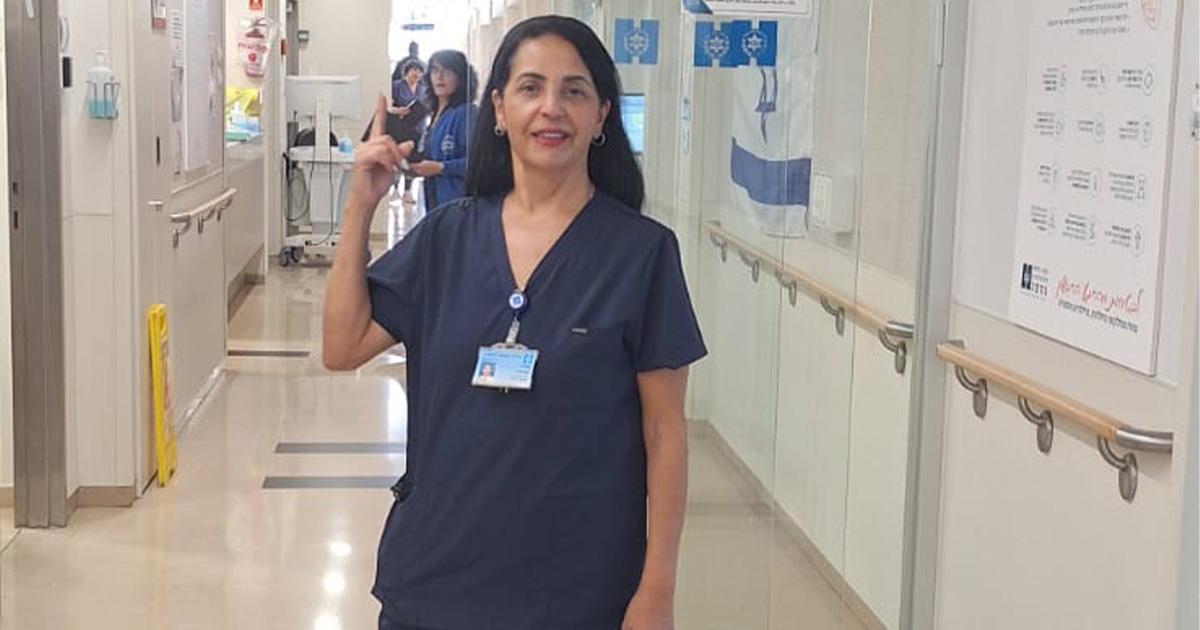During the COVID-19 pandemic, altruistic gestures have assumed special meaning as people continue to donate organs to help others live. Sometimes, the recipients are family members; other times, they are strangers.
Throughout the pandemic, the Hadassah Medical Organization’s transplant specialists have continued to perform transplants, though for a short period between March 15 and May 15, all non-urgent organ transplantations were deferred to comply with Israeli Government regulations. Between February and June, Hadassah performed 20 kidney transplantations, including 5 from cadavers and 15 from live donors. Hadassah also performed 11 liver transplantations during this period.
In a June 29 webinar hosted by Hadassah International, Dr. Abed Khalaileh, director of the Kidney Transplantation Service at Hadassah Hospital Ein Kerem, and Rachel Heber, director of Matnat Chaim (Gift of Life), an Israeli organization that encourages and facilitates kidney donations, discussed how the COVID-19 pandemic has impacted organ transplantation at Hadassah.
Dr. Khalaileh explained his challenge to keep both donor and recipient safe from COVID-19. While Hadassah has totally separated COVID-19 patients from the general hospital population, the decision as to who should undergo transplant surgery has to be reconsidered in terms of the intensified risk from COVID-19 against the benefit of the transplantation.
Israel currently has more than 1,000 people on the waiting list for a kidney and more than 150 who are waiting for a liver. Unfortunately, many will die before receiving the transplant. For some, the risk of dying without a new organ is greater than the risk of dying from COVID-19. For these patients, when an organ becomes available, the transplant is a risk worth taking despite the pandemic.
Dr. Abed Khalaileh brings his compassion and skills as an outstanding Hadassah surgeon and a special human being to saving the lives of those who need an organ transplant to survive.
Dr. Khalaileh explained that organ donations come from various sources. Some are cadaveric (donated shortly after death), some come from living family members, some come from altruistic donors, and others through organ exchange programs, where a family member (who is not a match for the relative needing an organ) will donate an organ to a third party and, in return, that recipient’s family will donate an organ to someone else.
At Hadassah, transplantation surgery in this era of COVID-19 starts with screening 2 weeks before an elective transplant surgery and continues through the day before the transplant procedure to ensure that the recipient and the donor are both COVID-19 free. When there is a cadaveric donation, the deceased is tested for COVID-19 before the organ is donated.
Operating room procedures have changed due to COVID-19. Only the anesthesiologist wearing an N-95 mask is present during intubation and extubation. The rest of the staff wait outside for about 20 minutes. A minimal number of staff is present during the surgery.
Dr. Khalaileh reported that there is no evidence that people needing a transplant are at higher risk for acquiring COVID-19 than the general population. However, he said, the transplant community is immunosuppressed with comorbidities, and they are often elderly.
When people who have already received a kidney or liver transplant get COVID-19, their symptoms are a little different. Fever is less common, probably due to immunosuppressive therapy. They exhibit profound lymphopenia (an abnormally low level of lymphocytes), but the severity of the illness depends on their comorbidities. These patients are treated in the same way as non-transplant patients; however, their medications have to be adjusted, taking into account their personal situation.
Many of the organs transplanted by Dr. Khalaileh come from donors who Matnat Chaim motivated to take this altruistic step. Matnat Chaim was started by Rabbi Yeshayahu Heber, a former schoolteacher and principal, who was a kidney recipient himself. At the age of 42, he was struck by kidney disease. He went from working two jobs and having an active life as husband and dad to a life dominated by dialysis. In the long hours attached to the dialysis machines, he became friends with a young kidney patient named Pinchas Turgeman, whose brother was killed in military service. After Rabbi Heber was gifted a kidney by a friend, he tried to find a kidney for Turgeman. The kidney arrived too late. Turgeman died and his parents buried their second son.
Although Rabbi Heber’s physical health was much improved after his successful transplant, he was desolate over the loss of his friend and the knowledge that he might have been saved if organs were available. He decided to become a full-time advocate for kidney donation and founded Matnat Chaim. He wanted to make sure that no more people would die on dialysis while waiting for a kidney.
Following Rabbi Heber’s death on April 23 from COVID-19, Mrs. Heber became Matnat Chaim’s director.
To date, 833 live kidney transplantations have taken place in Israel thanks to donors encouraged by Matnat Chaim, making Israel one of the top countries in the world for kidney donations from living individuals. Matnat Chaim places ads in magazines, on television and radio, and in neighborhoods throughout the country. Friends bring friends, and families come forward together to donate. Matnat Chaim regards their donors as “angels.”
Read about the fulfillment of a Hassidic mother’s promise to donate a kidney.
Watch the webinar at: https://www.youtube.com/watchv=lGjvcGMSkQQ&feature=youtu.be
Hear more about Dr. Van Heerden's work on the Hadassah On Call podcast.



.svg)





